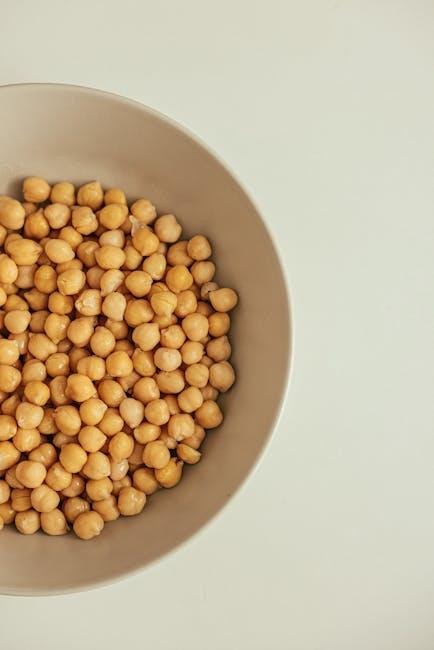Building muscle isn’t solely reserved for those who consume animal products. As the fitness world evolves, so does our understanding of nutrition, and plant-based proteins have emerged as powerful allies in the quest for muscle growth. Whether you’re a seasoned athlete or a newcomer to strength training, understanding the best plant-based proteins can enhance your performance and support your muscle-building goals. This article delves into the top plant-based protein sources, highlighting their nutritional benefits and how they can be effectively integrated into your diet. With the right knowledge and approach, you can harness the power of plants to fuel your fitness journey and achieve impressive results.
Exploring Nutrient-Dense Plant Proteins for Muscle Growth
When aiming to build muscle on a plant-based diet, it’s crucial to focus on nutrient-dense proteins that deliver essential amino acids and support muscle repair. Here are some top contenders that pack a powerful punch:
- Quinoa: Often dubbed a superfood, quinoa is a complete protein source, offering all nine essential amino acids. It’s versatile and can be used in salads, bowls, or as a rice substitute.
- Chickpeas: High in protein and fiber, chickpeas are great for muscle growth. They can be roasted for a crunchy snack or blended into hummus for a protein-rich dip.
- Lentils: With a rich protein profile and a host of nutrients like iron and magnesium, lentils are perfect for soups, stews, and even veggie burgers.
- Hemp Seeds: These tiny seeds are a powerhouse of protein and healthy fats. Sprinkle them on smoothies or salads to boost your protein intake.
- Tofu and Tempeh: Made from soybeans, these are excellent sources of protein that can be grilled, stir-fried, or added to curries for a muscle-building meal.
Incorporating these plant-based proteins into your diet not only supports muscle growth but also provides a range of other health benefits, making them a smart choice for any fitness enthusiast.

Maximize Muscle Synthesis with These Essential Plant-Based Sources
Elevate your plant-based diet with protein sources that are not only rich in amino acids but also perfect for building muscle. Incorporating a variety of these foods can ensure you receive all the essential nutrients needed for muscle growth and recovery.
- Quinoa: Known as a complete protein, quinoa contains all nine essential amino acids, making it an ideal staple for muscle synthesis. It’s versatile and can be added to salads, bowls, or enjoyed as a side dish.
- Lentils: These legumes pack a punch with high protein content and are also rich in iron and fiber. Lentils can be used in soups, stews, or even as a base for veggie burgers.
- Chickpeas: Another protein powerhouse, chickpeas are perfect for making hummus or adding to salads and curries. They offer a great balance of protein and complex carbohydrates.
- Hemp Seeds: With an impressive protein profile, hemp seeds are also high in omega-3 fatty acids, which aid in reducing inflammation and promoting muscle recovery. Sprinkle them over smoothies or oatmeal for a nutritional boost.
- Tofu and Tempeh: Both derived from soybeans, tofu and tempeh are excellent sources of protein and can be cooked in numerous ways to suit different tastes and textures.
By strategically incorporating these plant-based proteins into your diet, you can effectively support muscle building and enjoy a variety of delicious and nutritious meals.

Incorporating High-Protein Plant Foods into Your Fitness Regimen
Elevating your fitness game with plant-based proteins is both a nutritious and sustainable choice. These protein powerhouses not only support muscle growth but also provide a variety of essential nutrients. Here’s how you can seamlessly include them in your diet:
- Quinoa: A complete protein containing all nine essential amino acids, quinoa is perfect for post-workout meals. Try incorporating it into salads or as a base for your favorite stir-fry.
- Lentils: Packed with protein and fiber, lentils are incredibly versatile. They can be used in soups, stews, or even made into delicious plant-based patties.
- Chickpeas: Whether roasted as a crunchy snack or blended into hummus, chickpeas offer a hefty dose of protein. Add them to salads or use chickpea flour for baking to boost your protein intake.
- Hemp Seeds: These tiny seeds are nutritional powerhouses, rich in protein and omega-3 fatty acids. Sprinkle them on yogurt, smoothies, or oatmeal for an easy protein boost.
- Tofu and Tempeh: Derived from soybeans, both are excellent sources of protein. Tofu is versatile and can absorb flavors well, while tempeh offers a firmer texture with a nutty taste, perfect for grilling or stir-frying.
Integrating these high-protein plant foods into your fitness regimen will not only help in building muscle but also enhance overall well-being. Experiment with different combinations to find what works best for your taste and nutritional needs.
Expert Recommendations for Effective Plant-Based Muscle Building
Maximizing your gains on a plant-based diet is entirely achievable with the right protein sources. Here are some expert-recommended choices that can effectively fuel your muscle-building journey:
- Quinoa: Not just a carb, quinoa is a complete protein containing all nine essential amino acids, making it a powerhouse for muscle growth.
- Hemp Seeds: With an impressive protein content, hemp seeds are also rich in omega-3 and omega-6 fatty acids, which aid in muscle recovery and growth.
- Lentils: Versatile and protein-rich, lentils are a staple for any plant-based athlete, providing a good balance of carbs and protein for energy and repair.
- Chickpeas: These legumes offer a robust protein punch and are perfect for post-workout meals to help replenish glycogen stores and build muscle.
- Pea Protein: An excellent supplement option, pea protein is easily digestible and often combined with other plant proteins to provide a full amino acid profile.
Incorporating these plant-based proteins into your diet can help you build muscle effectively while enjoying the benefits of a plant-focused lifestyle. Prioritize variety to ensure you’re getting a balanced intake of all necessary nutrients.




